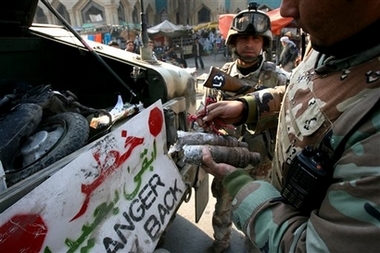Suicide car bombing kills 26 in Baghdad
(AP)Updated: 2007-01-26 09:53
AGHDAD, Iraq - Iraq's prime minister insisted Thursday there will be "no safe place in Iraq for terrorists," hours before a suicide car bombing killed at least 26 people in the Shiite neighborhood of Karradah and two rockets slammed into the heavy fortified Green Zone not far from the US Embassy.
Seven charred bodies were visible in one of the vans, including that of a woman who was half out a window in an apparent attempt to escape the inferno. Another women dressed in black was seen screaming in front of her son's shop, where he was killed. Ambulances raced from the scene, at least one with the back door still open and bodies stacked in the back.
A second huge explosion later rattled the capital, but police said it was a controlled blast to destroy a second car explosive that had been disabled before its suicide bomber could detonate it.
As the rockets fell and bombs exploded across the Tigris River, the public address system inside the Green Zone compound could be heard warning in English that people should take cover because "this is not a drill."
Five people were wounded in the rocket attack, none seriously. Mortar and rocket attacks hit the zone frequently but reported casualties are rare.
The attacks came on a day that police reported 61 killed in sectarian violence nationwide, including the bodies of 22 torture victims dumped in Baghdad, and a parliamentary debate was suspended briefly after arguments broke out between Sunnis and Shiites over security.
Parliament held yet another raucous session, this time witnessing a heated exchange between Prime Minister Nouri al-Maliki and Sunni legislator and cleric Abdul-Nasser al-Janabi, who accused the Shiite-dominated government of carrying out purges against Sunnis, the minority sect in Iraq.
The prime minister was seeking support for his and President Bush's plan to crush sectarian violence in Baghdad.
Al-Maliki gave no details for the plan, which he named "Operation Imposing Law," nor did he say when it would begin. US officials have indicated the security operation, to which Bush has pledged an additional 21,500 American soldiers, should start in earnest about Feb. 1. A brigade of the 82nd Airborne Division already has arrived for the mission.
The prime minister vowed to go after those behind Baghdad's rampant violence no matter where they try to hide and regardless of sectarian beliefs, promising at the same time to ensure the human rights of innocent Iraqis.
"We are full of hope. We have no other choice but to use force and any place where we receive fire will not be safe even if it is a school, a mosque, a political party office or home," he said. "There will be no safe place in Iraq for terrorists."
But al-Janabi took the floor and said al-Maliki's government had gratuitously and summarily fired former members of Saddam Hussein's ousted Baath party from government jobs, sentenced people to death for political reasons and detained without reason Sunni pilgrims returning from the hajj in Saudi Arabia this month.
He also accused al-Maliki of running a sham program to reconcile Sunni-Shiite differences that have produced a near-civil war in Baghdad and prompted the new security drive- the third since al-Maliki took office May 25.
"The firing of officers and civil servants under the pretext of de-Baathification should stop. What kind of national reconciliation are you talking about when you are implementing rules that marginalize" Sunnis, he asked.
"Stop sentencing innocent people to death because such sentences are
politically motivated," al-Janabi implored, adding that Sunnis do not trust the
government.
| 1 | 2 |  |
|
||
|
||
|
|

